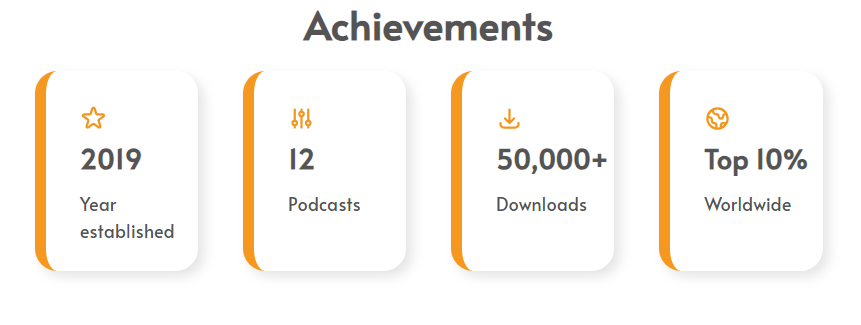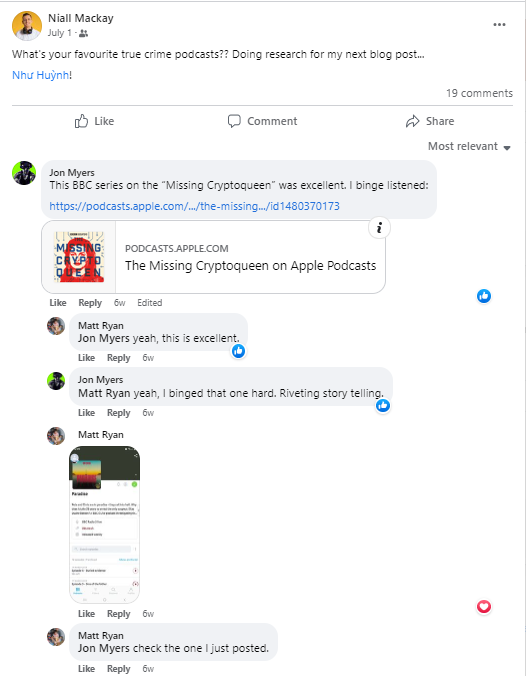I think most podcasters will aim to produce a successful podcast show. But what exactly defines podcast success? The numbers, the feedback, or the quality of your show? Don’t worry, I will answer these questions and show you how to measure podcast success.
I’m Niall Mackay – The Podcast Guy. I’m the founder of Seven Million Bikes Podcasts, podcast host of A Vietnam Podcast, and other podcast shows. A Vietnam Podcast now gains over 50,000 downloads putting it in the top 10% of podcasts worldwide. That’s one of the things I look at to see how well my podcast is doing.
But there are lots of other things besides metrics. The path to podcast success is as diverse as the voices that grace the medium. It’s an intricate dance between quantitative measures and qualitative resonance, where the heartbeat of accomplishment varies among podcast creators.
By the time you reach the end of this guide, you’ll not only understand what defines podcast success but also possess the tools to measure and refine it.
Now join me to understand the success measurement and make your show become a successful one.

Definition Of Success
There’s no exact definition of a successful podcast. Success in podcasting transcends the boundaries of a singular definition. It’s a spectrum, a spectrum that stretches across a myriad of podcasting motives and objectives. At its core, success mirrors the fulfillment of your podcast’s purpose and the attainment of the goals you set out to achieve.
If podcasting and sharing valuable content is your passion, the aha moments sparked in a listener’s mind, positive feedback and the tangible difference your podcast makes in someone’s life define your success.
For the business-oriented podcaster, success lies in reach and resonance. It’s the amplified brand awareness, the surge in website traffic, and the bustling community that springs forth.
If you start your podcast to monetize, the money you receive from sponsorship, donation, or the profits from your products will be your success.
And for me, my passion for sharing, speaking, and knowing other’s stories urged me to start my own podcast. Therefore, more than 50,000 downloads of “A Viet Nam Podcast ” is a success to me because it shows my content is interesting and my audience wants to listen again. It may not be a success to other podcasters, just because we have different goals and purposes.

So just be patient and consistent with your goals, keep producing high-quality content, and consult other experts and the success will come sooner or later. However, it is important to know your podcast’s growth and to measure it so that you can see your strengths and weaknesses and improve them in future episodes.
Measuring Podcast Success – Podcast Metrics and Data
To measure our podcast growth, we rely on some performance metrics that provide valuable insights into various aspects of your podcast’s performance. These metrics help you understand target audience engagement, reach, content effectiveness, and more.
- Audience
Total Number of Listeners
This metric provides an overview of your podcast’s overall reach. It’s the cumulative count of unique listeners who have engaged with your podcast over a specific period. As your podcast gains traction, you should see an upward trend in this number, indicating growth in your audience base.
Listeners Per Episode
Analyzing how many podcast listeners per podcast episode helps you identify which topics, formats, or guests are resonating most with your audience. This insight can guide your content strategy, allowing you to create more of what your listeners enjoy, ultimately boosting engagement and retention.

Playthrough Rate
The playthrough rate measures the percentage of listeners who complete an entire episode. A higher playthrough rate suggests that your content is compelling and keeps listeners engaged until the end. This metric can help you identify episodes that resonate well with your audience and replicate their successful elements.
Follower Counts
Follower counts reflect your podcast’s dedicated audience – those who have chosen to stay updated with your content. These podcast subscribers receive notifications when new episodes are released, fostering a loyal listener base. A steady increase in follower counts indicates that your podcast is building a community that values your content.

- Podcast Episodes
Total Episode Streams/Downloads
This metric indicates how many times an episode has been streamed or downloaded. It reflects the overall popularity and reach of the episode. A higher number of streams/downloads indicates strong listener interest.
Listener Retention and Drop-Off
Analyze the episode’s listener retention rate, which shows how long listeners stay engaged. Identify points in the episode where listeners tend to drop off. This helps you understand the content that holds their attention and areas that may need improvement.
Average Listening Time
This metric reveals how long listeners typically engage with an episode. It helps identify episodes with higher engagement and those that may need adjustments to maintain interest throughout.
Downloads vs. Streams
Differentiate between episode downloads and streams to understand how listeners consume your content. Downloads indicate episodes that listeners want to keep for offline listening, while streams reflect immediate consumption.

- Monetization
Monetization metrics provide a crucial lens through which you can assess the depth of your audience’s engagement and the value they perceive in your podcast. These metrics go beyond mere numbers and revenue; they reflect the level of trust, loyalty, and impact your podcast has on its listeners.
Monetizing your podcast involves generating revenue through sponsorships, ads, listener support, or by driving sales for your products and services. Effectively measuring the success of your podcast’s monetization efforts requires tracking specific metrics related to revenue, conversion rates, and audience engagement.
Revenue and Profit
- Sponsorship Income
Track the revenue generated from sponsorships and advertisements featured in your podcast episodes. Calculate the total income earned from sponsors and compare it to your production costs to determine the profitability of these partnerships.
- Listener Support
If you offer premium content or listener support options (e.g., Patreon), measure the total income generated from your dedicated audience. This can provide insights into the willingness of your listeners to financially support your podcast.
Some podcast directories, such as Spotify, have “support” features that allow listeners to donate to their favorite shows. Spotify is a dedicated platform that offers many monetizing features, you shouldn’t miss my blog about how to monetize podcast on Spotify.
Conversion Rates
- Sales Conversion Rate
If your podcast promotes products, services, or online courses, monitor the conversion rate of listeners who become paying customers. Calculate the percentage of listeners who take the desired action, such as making a purchase, after hearing your podcast promotion.
- Discount Code Usage
If you offer exclusive discount codes to your podcast audience, track the number of codes redeemed. This metric indicates the effectiveness of your podcast in driving sales and incentivizing conversions.
- Affiliate Marketing
If you engage in affiliate marketing, measure the number of listeners who click on affiliate links and subsequently make a purchase. This metric helps assess the impact of your podcast on affiliate sales.
Measuring Podcast Success – Other Platforms
Podcast interaction transforms passive listeners into active participants. The comments, questions, and discussions that unfold around your episodes create a vibrant community that resonates with your content. An engaged community is a testament to your podcast’s ability to foster meaningful connections and contribute positively to listeners’ lives.
Besides, there are some additional ways to measure your podcast performance, through other marketing channels.
Social Media
Promote podcasts on social media is one of the easiest marketing strategies.
Social media isn’t merely a digital playground; it’s a dynamic space where your podcast’s voice resonates and ignites conversations. In your social media posts, see if they have:
- Likes, Comments, and Shares
Beyond mere numbers, assess the quality of interactions. Are listeners leaving thoughtful comments? Are they sharing episodes with personalized captions? Meaningful engagements reflect a connection that goes beyond a casual scroll.

- Discussion Participation
Gauge the vitality of discussions sparked by your podcast. Are listeners engaging in dialogue around your episodes? Are they asking questions or sharing personal experiences related to your content? The depth of conversation indicates the resonance your podcast has achieved.
Website
Building quality websites helps establish a strong online presence and enhance your podcast’s success. You can promote your podcast show, and your products, writing blogs and show notes to increase discoverability on search engines by using keywords.

Track website traffic and pageviews for your podcast’s website or blog then analyze which episodes or blog posts receive the most views and engagement. Check for:
- Bounce Rate and Time Spent
Analyze the bounce rate—how quickly visitors leave your site after arriving. A lower bounce rate suggests engaged listeners. Additionally, time spent on your site reflects the depth of exploration and engagement.
- Comments and Inquiries
Track the number of comments on episode pages or blog posts. Engaging content prompts listeners to share their thoughts. Inquiries signal an active interest in your podcast, reflecting a deeper level of engagement.
- Reviews and Ratings
Beyond star ratings, look at the content of reviews. Positive feedback highlights aspects of your podcast that resonate, while constructive criticism offers opportunities for growth. Responding to reviews fosters a sense of community and connection, encouraging more engagement from both existing and potential listeners.
Podcast Analytics Platforms
To check and track the metrics for your podcast’s website, social media, platforms, and podcast directories, you can use a combination of tools and platforms.
They are essential tools that provide podcasters with insights and data to measure the performance and success of their podcasts. These platforms offer a range of metrics and analytics that help creators understand their audience, track engagement, and make informed decisions to improve their content.
For websites:
- Google Analytics
Set up Google Analytics for your website to track visitor traffic, page views, user engagement, and more. You’ll get detailed insights into how people interact with your site. Take time to learn about podcast SEO to increase your podcast’s discoverability on Google.
- Website Hosting Analytics
Many website hosting providers offer built-in analytics tools that provide information about your website’s performance, traffic, and other relevant metrics.
Recommendations: WordPress, Wix, or Squarespace
For podcast:
- Spotify for Podcasters
- Apple Podcasts Connect
- Google Podcasts Manager
- Chartable

Tips To Make Your Podcast Successful
Understand Your Podcast
Defining this purpose is akin to drawing a map that charts your podcast’s course, helping you navigate the vast sea of content creation with intention and clarity.
- Goals and Target Audience
Your podcast goals reflect the driving force behind your podcast. Are you seeking to educate, entertain, inspire, or perhaps provoke thought? Pinpoint the core emotion or intention that compels you to share your message.
Understand the individuals you’re speaking to. What are their interests, pain points, or aspirations? Tailor your purpose and podcast content to align with their needs, as a podcast that resonates deeply with its podcast listeners is more likely to thrive.
- Clear Plan
Consider the change you wish to enact through your podcast. Whether it’s raising awareness about a particular issue, sparking conversations, or providing practical solutions, valuable insights defining the impact guide your content toward significance.
I have a “starting a podcast checklist“, which includes all the things you need to produce a podcast, especially when you’re a beginner.
In a sea of podcasts, uniqueness is key. Determine what sets your podcast apart from the rest. Is it your storytelling style, the expertise you bring, or the innovative format you’ve envisioned?
Continuous Learning
Continuous learning and skill development are integral components of becoming a successful podcaster. As the podcasting landscape evolves and audience preferences shift, staying ahead requires a commitment to honing your craft and acquiring new skills.
Podcasting trends, technology, and audience behavior change over time. Staying informed about industry developments ensures your podcast remains relevant and engaging. Don’t forget to learn new skills that enable you to create high-quality content. Improving your recording, editing, and storytelling abilities enhances the overall listener experience.
Enroll in online courses or attend workshops that cover various aspects of podcasting, such as audio editing, scriptwriting, interview techniques, and marketing.

Marketing Strategies
High-quality, engaging episodes are the foundation of your podcast. Focus on producing content that resonates with your target audience.
Leverage social media, your website, and other platforms to promote episodes. Use relevant keywords in your podcast titles, descriptions, and episode notes. This can help your podcast appear in search results on podcast platforms and search engines.
Some marketing strategies you can apply for your show:
- Guest Collaborations
- Content Repurposing
- Cross-Promotion
- Podcast Artwork and Branding
To know more, you can read my blog about how to make your podcast viral, it also contributes to your podcast growth.
Measure Podcast Success Summary
Whether you aim to enlighten, entertain, expand your brand, or generate revenue, your definition of success becomes deeply intertwined with your podcast’s purpose and your aspirations as a creator.
Measuring podcast success isn’t merely a matter of counting numbers; it’s a compass that directs you toward growth and excellence. By tracking audience metrics, you understand the heartbeat of your listeners and uncover which episodes resonate most. Engaging with your community on social media, websites, platforms, and podcast directories offers valuable insights into their preferences and affinities.
Now, let’s check your analytics platforms and see how your podcast grows and succeeds!


